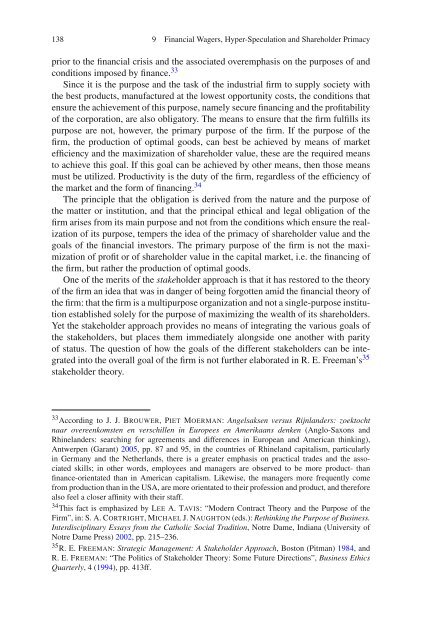The Ethics of Banking: Conclusions from the Financial Crisis (Issues ...
The Ethics of Banking: Conclusions from the Financial Crisis (Issues ...
The Ethics of Banking: Conclusions from the Financial Crisis (Issues ...
Create successful ePaper yourself
Turn your PDF publications into a flip-book with our unique Google optimized e-Paper software.
138 9 <strong>Financial</strong> Wagers, Hyper-Speculation and Shareholder Primacy<br />
prior to <strong>the</strong> financial crisis and <strong>the</strong> associated overemphasis on <strong>the</strong> purposes <strong>of</strong> and<br />
conditions imposed by finance. 33<br />
Since it is <strong>the</strong> purpose and <strong>the</strong> task <strong>of</strong> <strong>the</strong> industrial firm to supply society with<br />
<strong>the</strong> best products, manufactured at <strong>the</strong> lowest opportunity costs, <strong>the</strong> conditions that<br />
ensure <strong>the</strong> achievement <strong>of</strong> this purpose, namely secure financing and <strong>the</strong> pr<strong>of</strong>itability<br />
<strong>of</strong> <strong>the</strong> corporation, are also obligatory. <strong>The</strong> means to ensure that <strong>the</strong> firm fulfills its<br />
purpose are not, however, <strong>the</strong> primary purpose <strong>of</strong> <strong>the</strong> firm. If <strong>the</strong> purpose <strong>of</strong> <strong>the</strong><br />
firm, <strong>the</strong> production <strong>of</strong> optimal goods, can best be achieved by means <strong>of</strong> market<br />
efficiency and <strong>the</strong> maximization <strong>of</strong> shareholder value, <strong>the</strong>se are <strong>the</strong> required means<br />
to achieve this goal. If this goal can be achieved by o<strong>the</strong>r means, <strong>the</strong>n those means<br />
must be utilized. Productivity is <strong>the</strong> duty <strong>of</strong> <strong>the</strong> firm, regardless <strong>of</strong> <strong>the</strong> efficiency <strong>of</strong><br />
<strong>the</strong> market and <strong>the</strong> form <strong>of</strong> financing. 34<br />
<strong>The</strong> principle that <strong>the</strong> obligation is derived <strong>from</strong> <strong>the</strong> nature and <strong>the</strong> purpose <strong>of</strong><br />
<strong>the</strong> matter or institution, and that <strong>the</strong> principal ethical and legal obligation <strong>of</strong> <strong>the</strong><br />
firm arises <strong>from</strong> its main purpose and not <strong>from</strong> <strong>the</strong> conditions which ensure <strong>the</strong> realization<br />
<strong>of</strong> its purpose, tempers <strong>the</strong> idea <strong>of</strong> <strong>the</strong> primacy <strong>of</strong> shareholder value and <strong>the</strong><br />
goals <strong>of</strong> <strong>the</strong> financial investors. <strong>The</strong> primary purpose <strong>of</strong> <strong>the</strong> firm is not <strong>the</strong> maximization<br />
<strong>of</strong> pr<strong>of</strong>it or <strong>of</strong> shareholder value in <strong>the</strong> capital market, i.e. <strong>the</strong> financing <strong>of</strong><br />
<strong>the</strong> firm, but ra<strong>the</strong>r <strong>the</strong> production <strong>of</strong> optimal goods.<br />
One <strong>of</strong> <strong>the</strong> merits <strong>of</strong> <strong>the</strong> stakeholder approach is that it has restored to <strong>the</strong> <strong>the</strong>ory<br />
<strong>of</strong> <strong>the</strong> firm an idea that was in danger <strong>of</strong> being forgotten amid <strong>the</strong> financial <strong>the</strong>ory <strong>of</strong><br />
<strong>the</strong> firm: that <strong>the</strong> firm is a multipurpose organization and not a single-purpose institution<br />
established solely for <strong>the</strong> purpose <strong>of</strong> maximizing <strong>the</strong> wealth <strong>of</strong> its shareholders.<br />
Yet <strong>the</strong> stakeholder approach provides no means <strong>of</strong> integrating <strong>the</strong> various goals <strong>of</strong><br />
<strong>the</strong> stakeholders, but places <strong>the</strong>m immediately alongside one ano<strong>the</strong>r with parity<br />
<strong>of</strong> status. <strong>The</strong> question <strong>of</strong> how <strong>the</strong> goals <strong>of</strong> <strong>the</strong> different stakeholders can be integrated<br />
into <strong>the</strong> overall goal <strong>of</strong> <strong>the</strong> firm is not fur<strong>the</strong>r elaborated in R. E. Freeman’s 35<br />
stakeholder <strong>the</strong>ory.<br />
33 AccordingtoJ.J.BROUWER, PIET MOERMAN: Angelsaksen versus Rijnlanders: zoektocht<br />
naar overeenkomsten en verschillen in Europees en Amerikaans denken (Anglo-Saxons and<br />
Rhinelanders: searching for agreements and differences in European and American thinking),<br />
Antwerpen (Garant) 2005, pp. 87 and 95, in <strong>the</strong> countries <strong>of</strong> Rhineland capitalism, particularly<br />
in Germany and <strong>the</strong> Ne<strong>the</strong>rlands, <strong>the</strong>re is a greater emphasis on practical trades and <strong>the</strong> associated<br />
skills; in o<strong>the</strong>r words, employees and managers are observed to be more product- than<br />
finance-orientated than in American capitalism. Likewise, <strong>the</strong> managers more frequently come<br />
<strong>from</strong> production than in <strong>the</strong> USA, are more orientated to <strong>the</strong>ir pr<strong>of</strong>ession and product, and <strong>the</strong>refore<br />
also feel a closer affinity with <strong>the</strong>ir staff.<br />
34 This fact is emphasized by LEE A. TAVIS: “Modern Contract <strong>The</strong>ory and <strong>the</strong> Purpose <strong>of</strong> <strong>the</strong><br />
Firm”, in: S. A. CORTRIGHT,MICHAEL J. NAUGHTON (eds.): Rethinking <strong>the</strong> Purpose <strong>of</strong> Business.<br />
Interdisciplinary Essays <strong>from</strong> <strong>the</strong> Catholic Social Tradition, Notre Dame, Indiana (University <strong>of</strong><br />
Notre Dame Press) 2002, pp. 215–236.<br />
35 R. E. FREEMAN: Strategic Management: A Stakeholder Approach, Boston (Pitman) 1984, and<br />
R. E. FREEMAN: “<strong>The</strong> Politics <strong>of</strong> Stakeholder <strong>The</strong>ory: Some Future Directions”, Business <strong>Ethics</strong><br />
Quarterly, 4(1994), pp. 413ff.

















